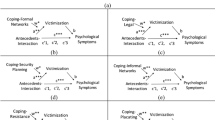Abstract
This study examined attributions for husband to wife marital agression as a function of aggression severity and husbands' alcohol use. Subjects were a community sample of 117 wives and 109 husbands who reported an episode of serious physical aggression during a structured interview, conducted at one year of marriage. The results showed that husbands' attributions were influenced by both severity and alcohol use. In particular, sober husbands tended to blame their wives for severe aggression, but, unexpectedly, drinking husbands tended to assume responsibility for severe aggression. In contrast, wives' attributions were influenced mainly by severity. Wives also discriminated between the locus and stability dimensions of causal attributions, whereas husbands relied solely on the locus dimension. Specifically, wives held husbands' behavior more responsible for severe aggression than their own behavior and held husbands' character much more responsible than their own character. Additional findings with regard to relationship attributions were discussed.
Similar content being viewed by others
References
Baucom, D. H., Sayers, S., and Duhe, A. (1989). Attributional style and attributional patterns among married couples.J. Pers. Soc. Psychol. 56: 596–607.
Berglas, S. (1987). Theoretical origins of the self-handicapping formulation. In Blane, H. T., and Leonard, K. E. (eds.),Psychological Theories of Drinking and Alcoholism, Guilford Press, New York, pp. 307–311.
Bograd, M. (1988). How battered women and abusive men account for domestic violence: Excuses, justifications, or explanations? In Hotaling, G. T., Finkelhor, J. T., Kirkpatrick, J. T., and Straus, M. A. (eds.),Coping With Family Violence: Research and Policy Perspectives, Sage, Newbury Park, CA, pp. 60–70.
Bradbury, T. N., and Fincham, F. D. (1990). Attributions in marriage: Review and critique.Psychol. Bul. 107(1): 3–33.
Coleman, D. H., and Straus, M. A. (1983). Alcohol abuse and family violence. In Gottheil, E., Druley, K. A., Skoloda, T. E., and Waxman, H. M. (eds.),Alcohol, Drug Abuse and Aggression, Charles C, Thomas, Springfield, IL, pp. 104–124.
Frieze, I. H. (1979). Perceptions of battered wives. In Frieze, I. H., Bar-Tal, D., and Carroll, J. S. (eds.),New Approaches to Social Problems: Applications of Attribution Theory, Jossey-Bass, Inc., San Francisco, CA, pp. 79–188.
Frieze, I. H. (1987, July).Perceptions of battering by battered women, Paper presented at the Third National Family Violence Research Conference, University of New Hampshire.
Frieze, I. H., Knoble, J., Zomnir, G., and Washburn, C. (1980, March).Types of battered women, Paper presented at the Annual Research Conference of the Association for Women in Psychology, Santa Monica, California.
Holtzworth-Munroe, A. (1988). Causal attributions in marital violence: Theoretical and methodological issues.J. Clin. Psychol. 8: 331–344.
Holtzworth-Munroe, A. (1992). Attributions and maritally violent Men: The role of cognitions in marital violence. In Harvey, J. H., Orbuch, T. L., and Weber, A. L. (eds.),Attributions, Accounts, and Close Relationships, Springer-Verlag, New York, pp. 165–175.
Holtzworth-Munroe, A., Waltz, J., Jacobson, N. S., Monaco, V., Fehrenback, P. A., and Gottman, J. M. (1992). Recruiting nonviolent men as control subjects for research on marital violence: How easily can it be done?V. Vict. 7: 79–88.
Janoff-Bulman, R. (1979). Characterological versus behavioral self-blame: Inquiries into depression and blame.J. Pers. Soc. Psychol. 37: 1798–1809.
Jones, E. E., and Davis, K. E. (1965). From acts to dispositions. In Berkowitz, L. (ed.),Advances in Experimental Social Psychology, Academic Press, New York, Vol. 2, pp. 219–266.
Leonard, K. E. (1993). Drinking patterns and intoxication in marital violence: Review, critique, and future directions for research. In National Institute on Alcohol Abuse and Alcoholism.Alcohol and interpersonal violence: Fostering interdisciplinary research (Research Monograph No. 25, NIH Pub. No. 93-3513), National Institute on Alcohol Abuse and Alcoholism, Rockville, Maryland.
Leonard, K. E., and Blane, H. T. (1992). Alcohol and marital aggressin in a national sample of young men.J. Inter. Viol. 7(1): 19–30.
Locke, H. J., and Wallace, K. M. (1959). Short marital-adjustment and prediction tests: Their reliability and validity.M. Fam. L 251–255.
O'Leary, K. D., Baling, J., Arias, I., Rosenbaum, A., Malone, J., and Tyree, A. (1989). Prevalence and stability of physical aggression between spouses: A longitudinal analysis.J. Consult. Clin. Psychol. 57: 263–268.
Porter, C. A. (1986).Coping and perceived control in battered women. Unpublished manuscript.
Richardson, D. C., and Campbell, J. L. (1980). The effects of alcohol on attributions of blame for wife abuse.J. Pers. Soc. Psychol. 6: 51–56.
Sonkin, D. J., Martin, D., and Walker, L. E. A. (1985).The Male Batterer. A Treatment Approach, Springer Publishing Company, New York.
Straus, M. A. (1979). Measuring intrafamily conflict and violence: The Conflict Tactics (CT) Scales.J. Mar. Fam. 41: 75–88.
Straus, M. A. (1990). The Conflict Tactics Scales and its critics: An evaluation and new data on validity and reliability. In Straus, M. A., and Gelles, R. J. (eds.),Physical Violence in American Families: Risk Facton and Adaptations to Violence in 8,145 Families. Transaction Publishers, New Brunswick, NJ, pp. 49–73.
Straus, M. A., and Gelles, R. J. (1986). Societal change and change in family violence from 1975 to 1985 as revealed by two national surveys.J. Marr. 48: 465–479.
Walker, L. E. (1979).The Battered Woman, Harper and Row, New York.
Author information
Authors and Affiliations
Rights and permissions
About this article
Cite this article
Senchak, M., Leonard, K.E. Attributions for episodes of marital aggression: The effects of aggression severity and alcohol use. J Fam Viol 9, 371–381 (1994). https://doi.org/10.1007/BF01531946
Issue Date:
DOI: https://doi.org/10.1007/BF01531946




